| |
05.12.2013
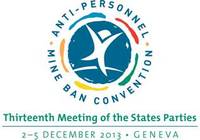
Download the press release | PDF200KB
Geneva – The Thirteenth Meeting of the States Parties (13MSP) of the Anti-Personnel Mine Ban Convention has concluded a week of work, marking major advances in demining and having taken steps to address a concern about compliance with the Convention in Yemen.
Clearing all mined areas: - Four States Parties – Bhutan, Germany, Hungary and Venezuela – declared having cleared all mined or suspected mined areas under their jurisdiction or control, thereby complying with their Convention obligations. There are now 27 States Parties that have completed implementation of this aspect of the Convention.
- Thirty-two (32) States Parties are still in the process of clearing mined areas. Of these, six (6) States Parties requested and were granted extensions on their mine clearance deadlines: Chad until 1 January 2020, Mozambique until 31 December 2014, Niger until 31 December 2015, Serbia until 1 March 2019, Sudan until 1 April 2019 and Turkey until 1 March 2022.
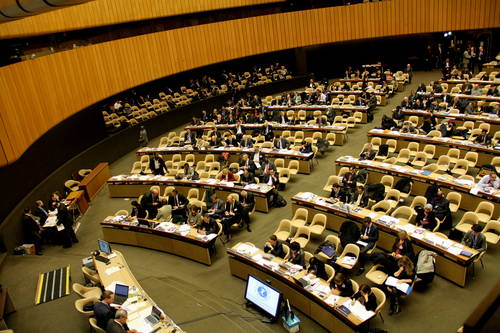
Ensuring compliance: - The Meeting expressed deep concern about the use, as well as allegations of use, of anti-personnel mines in different parts of the world and reaffirmed the determination of the States Parties to the Convention to put an end to the suffering and casualties caused by these weapons.
- With regard to the breach of the Convention in “Wadi Bani Jarmouz” in Yemen, the Meeting expressed its appreciation of the Government of Yemen’s Official Communiqué of 17 November 2013, outlining the seriousness of the situation, Yemen’s renewed commitment towards all aspects of the Convention and its commitment to investigate and take necessary action.
- In this regard, the Meeting warmly welcomed the commitment of Yemen to provide to the States Parties, through the President, an interim report by 31 March 2014, and a final report by 31 December 2014, on (a) the status and outcomes of Yemen’s investigation, (b) the identification of those responsible for deploying anti-personnel mines, and subsequent measures taken, (c) information on the source of the anti-personnel mines and how those mines were obtained, particularly given that Yemen had long ago reported the destruction of all stockpiles, (d) the destruction of any additional stocks discovered and the clearance of the mined areas in question, and (e) action to prevent and suppress any possible future prohibited activities undertaken by persons or on territory under its jurisdiction or control.
Destroying stockpiles:
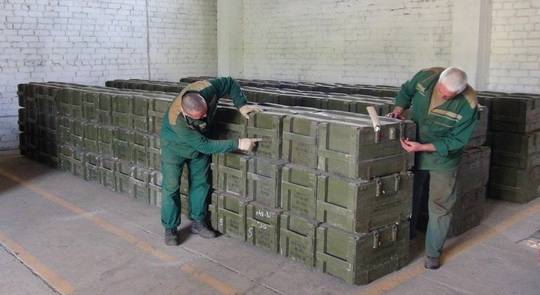
Stockpile destruction site in Ukraine - Photo provided by Ukraine- The Geneva Progress Report noted that over 44.5 million stockpiled antipersonnel have been destroyed by the States Parties since the Convention entered into force in 1999.
- Poland, the newest State Party with a 1 June 2017 deadline for destroying or ensuring the destruction of all stockpiled anti-personnel mines, indicated that its stockpile destruction programme is almost complete.
- Finland, which became a State Party in 2012 and has a 1 January 2016 deadline to complete the destruction of its stockpile, stated that it foresees ending work ahead of schedule by 2015
- Belarus, Greece and Ukraine – all of which have failed to comply with their deadlines for the destruction of all stockpiled anti-personnel mines – reported on their efforts. Belarus and Ukraine face a particular challenge in needing to destroy millions of the Soviet era PFM-1 mines, which is extremely hazardous and poses serious technical difficulties.
Assisting the victims: - A large number of delegations took the floor to emphasise the need to ensure that mine victims’ needs and rights are addressed as part of broader domains such as disability, health, education, employment, development and poverty reduction.
- Colombia announced that it will host a global conference on assisting mine victims in the broader contexts of human rights and disabilities. The conference, entitled Bridges Between Worlds, will take place in Medellin on 3-4 April 2014 and is part of a European Union Council Decision that supports the Convention’s aims.
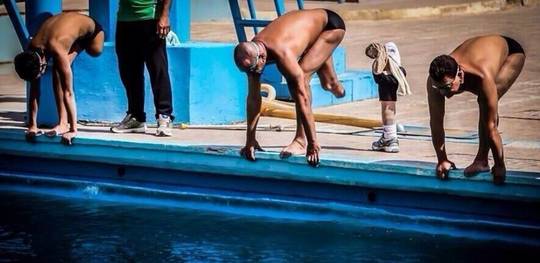
Iraqi landmine survivors at a paralympian competition - Photo, Iraqi delegation
Universalizing the Convention: - The Convention’s Special Envoy, His Royal Highness Prince Mired Raad Zeid Al-Hussein of Jordan, updated the States Parties on his October 2013 visit to China where he appealed to China to consider joining the Convention.
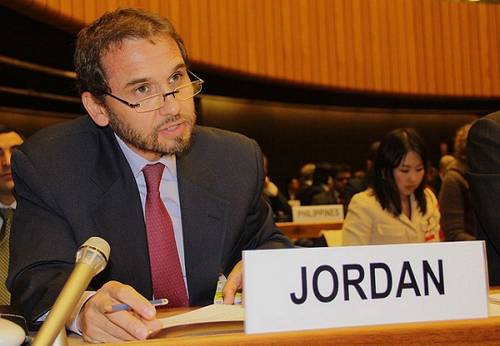
Prince Mired at the 13MSP in Geneva- The European Union updated the States Parties on its Council Decision that supports high level engagement by Prince Mired as well that by Princess Astrid of Belgium and Colombian Grammy Award winner Juanes.
- Poland participated for the first time as a State Party since the Convention entered into force for Poland in June 2013. With Poland’s ratification, all of the European Union members are now bound by the Convention.
The States Parties’ work has been recorded as the Geneva Progress Report, which highlights the progress made in 2013 and the challenges that will need to be addressed before June 2014 when the Convention meets again in Maputo, Mozambique.
The 13MSP ended a day earlier than usual to give way on 6 December for preparatory meeting for the 23-27 June 2014 Maputo Review Conference. In Maputo, the States Parties are expected to take major decisions, writing the next chapter of the anti-landmines movement.
|






